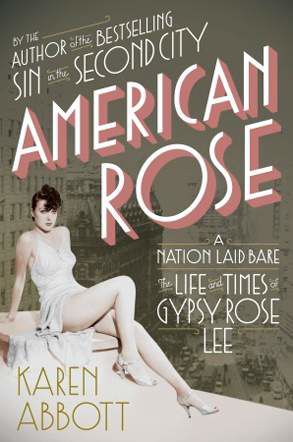Burlesque queen Gypsy Rose Lee in the raw
Published 4:00 am Sunday, January 9, 2011

- Burlesque queen Gypsy Rose Lee in the raw
“American Rose: A Nation Laid Bare: The Life and Times of Gypsy Rose Lee” by Karen Abbott (Random House, 422 pgs,, $26)
Though it calls itself “Burlesque,” the onstage antics in the squeaky-clean Cher-Christina Aguilera diva smackdown would hardly be recognizable to Gypsy Rose Lee, the burlesque queen and striptease artist who had to do some unspeakable things in her climb to the top.
But, as Karen Abbott shows in her enthralling biography, even “Gypsy” — the smash 1959 Broadway musical based on Lee’s 1957 memoirs — presents a fastidiously edited version of the performer’s life, leaving out sordid, seedy details. The show “is not only (Lee’s) monument but her surest chance for monumental revisionism,” she writes.
Abbott, the author of “Sin in the Second City,” about a famed whorehouse in early 20th century Chicago, sets out to fill in the blanks and debunk the self-created myths about the “most private public figure of her time,” though she admits that “trying to discover Gypsy the person, as opposed to Gypsy the persona, became the sort of detective story herself could have written.” (In addition to the novels “The G-String Murders” and “Mother Finds a Body” and her memoir, Lee, who had no formal education, wrote several New Yorker articles and a play, “The Naked Genius.”)
To illuminate not just Lee but the history of vaudeville, burlesque and New York City in the 1920s and ’30s, Abbott has chosen an unconventional structure, hopscotching nonchronologically between 1911 and 1970, the years of Lee’s birth and death. Beginning and ending “American Rose” with Lee’s performance at the 1940 World’s Fair, Abbott creates a brainy striptease similar to the one her subject may have performed: uncovering doozies in one chapter about Lee’s outrageous life, followed in the next by the less salacious (but always captivating) details about how New York City’s Minsky brothers, who played a crucial role in Lee’s stardom, built their burlesque empire.
Most of those doozies somehow involve the world’s most monstrous stage mother: Rose Thompson Hovick, of whom Morton Minsky declared, her “river did not run to the sea.” As children, Lee and her younger sister, actress June Havoc, were known, respectively, as Rose Louise and Baby June (later, Dainty June) on the vaudeville circuit; Mother acknowledged only Baby’s talent. Rose, Abbott writes, “raised her daughters as if they were two grizzled generals preparing for war — with men, with her, with each other.”
The Rose depicted here makes the leather-lunged tyrant embodied on stage and screen by Ethel Merman, Rosalind Russell and Patti LuPone look like Carol Brady. After June suffers a nervous breakdown at age 12 from nonstop work, Rose insists she get right back onstage. Mother was, literally, a murderer (killing once, and most likely twice, but never convicted of a crime) and a master manipulator (she played sick mind games not just with her daughters but with numerous women whom Abbott refers to as Rose’s “lesbian harem”).
But Rose is also, as Abbott details in a series of fascinating, sometimes queasy-making episodes, the love of thrice-married Gypsy Rose Lee’s life: “Theirs is a primal connection that Gypsy is incapable of severing, parallel to love and just as deep but rotten at its root.” Mama realizes her supposedly talentless firstborn is her meal ticket after Lee starts making a name for herself on the burlesque circuit in the early ‘30s.
Rose would anonymously send Gypsy flowers with cards addressed to “My Queen” and “Stageland’s Loveliest,” always signing them from “a secret admirer.” Mama’s constant presence was referenced in Gypsy’s famous quip, after her arrest for an “indecent performance”: “I wasn’t naked. I was completely covered by a blue spotlight. Just ask my mother, who is always with me.”
Rose and Gypsy, Abbott writes, were “keepers of each other’s secrets, hoarders of a devastating currency they couldn’t afford to trade.” After Rose died in 1954, Gypsy may have been free of her mother’s psychic pull, but she continued to follow her advice: “Just find a good story and stick with it.”



